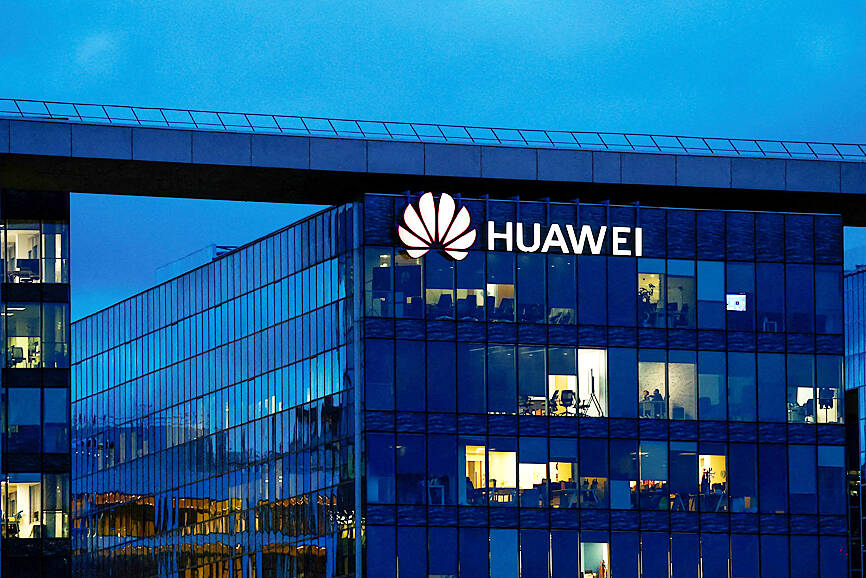Huawei Technologies Co (華為) and its partner Semiconductor Manufacturing International Corp (SMIC, 中芯) relied on US technology to produce an advanced chip in China last year, people with knowledge of the matter said.
Shanghai-based SMIC used gear from California-based Applied Materials Inc and Lam Research Corp to manufacture an advanced 7-nanometer chip for Huawei last year, the people said, asking not to be named as the details are not public.
The previously unreported information suggests that China still cannot entirely replace certain foreign components and equipment required for cutting-edge products like semiconductors.

Photo: Gonzalo Fuentes, Reuters
The country has made technological self-sufficiency a national priority and Huawei’s efforts to advance domestic chip design and manufacturing have received the backing of Beijing.
Lauded in China as a major leap in indigenous semiconductor fabrication, last year’s SMIC-made processor powered Huawei’s Mate 60 Pro and a wave of patriotic smartphone-buying in the Asian country. The chip is still generations behind the top components from global firms, but ahead of where the US hoped to stop China’s advance.
However, the machinery used to make it still had foreign sources, including technology from Dutch maker ASML Holding NV, as well as the gear from Lam and Applied Materials.
Bloomberg News reported in October that SMIC had used equipment from ASML for the chip breakthrough.
Leading Chinese chip equipment suppliers — including Advanced Micro-Fabrication Equipment Inc (中微半導體設備) and Naura Technology Group Co (北方華創) — have been trying to catch up with their US peers, but their offerings are still not as comprehensive or sophisticated.
China’s top lithography system developer Shanghai Micro Electronics Equipment Group Co (上海微電子) still lags a few generations behind what industry leader ASML is capable of.
SMIC obtained the US machinery before Washington banned such sales to China in October 2022, some of the people said. Both firms were among the US suppliers that began pulling their staff from China after those rules went into effect and prohibited US engineers from servicing some machines in the Asian country.
ASML also told US employees to stop working with Chinese customers in response to the US curbs, but Dutch and Japanese engineers are still able to service many machines in China — much to the chagrin of their US rivals.
Companies are now prohibited from selling cutting-edge, US-origin technology to either SMIC or Huawei. Both tech firms have been blacklisted by the US for alleged links to the Chinese military.
US Department of Commerce officials have said they have not seen evidence that SMIC can make the 7-nanometer chips “at scale,” a point echoed by ASML chief executive Peter Wennink.
If SMIC wants to advance its technology without ASML’s state-of-the-art extreme ultraviolet lithography systems, the Chinese chipmaker would not be able to produce chips at a commercially meaningful volume due to technical challenges, he told Bloomberg News in late January.
“The yield is going to kill you. You’re not going to get the number of chips that you need to have high volume chip production,” Wennink said.
ASML has not been able to sell its extreme ultraviolet lithography systems to China, as the Dutch government has not issued a license allowing those exports.

The US dollar was trading at NT$29.7 at 10am today on the Taipei Foreign Exchange, as the New Taiwan dollar gained NT$1.364 from the previous close last week. The NT dollar continued to rise today, after surging 3.07 percent on Friday. After opening at NT$30.91, the NT dollar gained more than NT$1 in just 15 minutes, briefly passing the NT$30 mark. Before the US Department of the Treasury's semi-annual currency report came out, expectations that the NT dollar would keep rising were already building. The NT dollar on Friday closed at NT$31.064, up by NT$0.953 — a 3.07 percent single-day gain. Today,

‘SHORT TERM’: The local currency would likely remain strong in the near term, driven by anticipated US trade pressure, capital inflows and expectations of a US Fed rate cut The US dollar is expected to fall below NT$30 in the near term, as traders anticipate increased pressure from Washington for Taiwan to allow the New Taiwan dollar to appreciate, Cathay United Bank (國泰世華銀行) chief economist Lin Chi-chao (林啟超) said. Following a sharp drop in the greenback against the NT dollar on Friday, Lin told the Central News Agency that the local currency is likely to remain strong in the short term, driven in part by market psychology surrounding anticipated US policy pressure. On Friday, the US dollar fell NT$0.953, or 3.07 percent, closing at NT$31.064 — its lowest level since Jan.

The New Taiwan dollar and Taiwanese stocks surged on signs that trade tensions between the world’s top two economies might start easing and as US tech earnings boosted the outlook of the nation’s semiconductor exports. The NT dollar strengthened as much as 3.8 percent versus the US dollar to 30.815, the biggest intraday gain since January 2011, closing at NT$31.064. The benchmark TAIEX jumped 2.73 percent to outperform the region’s equity gauges. Outlook for global trade improved after China said it is assessing possible trade talks with the US, providing a boost for the nation’s currency and shares. As the NT dollar

The Financial Supervisory Commission (FSC) yesterday met with some of the nation’s largest insurance companies as a skyrocketing New Taiwan dollar piles pressure on their hundreds of billions of dollars in US bond investments. The commission has asked some life insurance firms, among the biggest Asian holders of US debt, to discuss how the rapidly strengthening NT dollar has impacted their operations, people familiar with the matter said. The meeting took place as the NT dollar jumped as much as 5 percent yesterday, its biggest intraday gain in more than three decades. The local currency surged as exporters rushed to